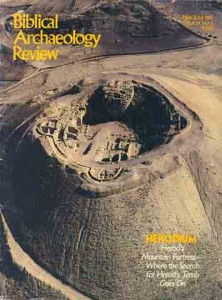Herod—The Man and His Deeds
Sidebar to: Searching for Herod’s Tomb
Herod was the son of Antipater the Idumean. Herod dethroned Mattathias Antigonus, the last of the Hasmoneans. With the support of the Romans, he assumed the throne in 37 B.C. and reigned until his death in 4 B.C. His modern appellation “the Great” is well deserved, for he was great in his deeds—both good and evil. Herod was a cautious politician who, throughout his life, was able to garner unstinting Roman support by appeasing the rulers of Rome. This enabled him to rule without serious competition and to extend his hegemony over more of the Holy Land than any of his predecessors, and even to lands far beyond. He was uncompromisingly cruel in suppressing the Hasmoneans, and relentless in the persecution of his opponents among his subjects and his own kinsfolk. Jewish enmity toward him stemmed from opposition to his foreign origin, and from his being a usurper who exterminated the Hasmoneans, the legal dynasty in Judea.
As a king, Herod aspired to glorify both his kingdom and his name. He was among the most extreme admirers of Hellenistic-Roman culture, and his desire to gain a standing for Jerusalem equal to that of the foremost Hellenistic cities led him to imbue his capital with a decidedly Hellenistic flavor. This found expression in the dominant architectural style of the buildings and their monumental proportions, as well as in the life style, which called for theaters, gymnasiums, hippodromes and “the games”—a cosmopolitan atmosphere and a luxurious court. This was neither entirely new nor unique in Jerusalem, where Hellenistic influence had already taken a hold under the Hasmoneans among the Jews of the city.
Already a library member? Log in here.
Institution user? Log in with your IP address.

